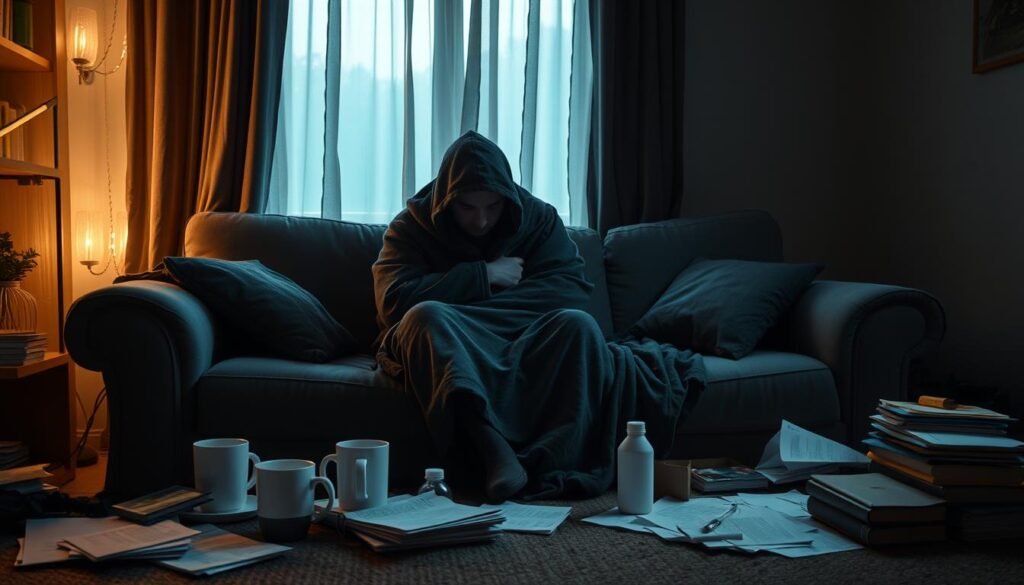Did you know over 70 million adults in the U.S. feel drained all the time? This happens even if they sleep well at night. This kind of tiredness can make fun activities hard to do. It can change how you enjoy life. It’s key to get advice from experts on this. They understand fatigue well and can find ways to make you feel better. Professor Julia Newton, an expert, says treatments should match what each person needs.
This article is a guide for those tired all the time. It highlights why getting help is important. We’ll look at common signs of fatigue and ways to manage it. This will help you feel better each day and improve your life. Understanding your limits and managing fatigue well can give you your energy back.
Key Takeaways
- Understanding the multifaceted nature of fatigue is crucial for effective management.
- Professionally guided fatigue relief strategies can improve overall well-being.
- Keeping a fatigue diary helps in recognizing personal limits.
- Mindfulness practices and regular breaks are beneficial in managing fatigue.
- Individualized approaches can lead to a more positive outlook on life.
Understanding Persistent Fatigue
Fatigue makes daily life hard, bringing many challenges. It means being very tired, affecting your body and mind. People find it hard to focus, lack motivation, and feel energy drain. Understanding how fatigue changes daily life is key. It can mess with work, friends, and overall happiness.
Defining Fatigue and Its Impact on Daily Life
Persistent fatigue is a big problem for those affected. It makes you feel extremely tired, even after resting. The condition shows up in many ways, like headaches, focus problems, and being quick to anger. For many, it mixes with life and work duties, causing less productivity and feeling alone. Knowing about fatigue helps us see its impact. Spotting patterns and triggers helps in making plans to handle it.
Common Causes of Persistent Fatigue
Many things can cause fatigue. Key causes include:
- Sleep disorders, like sleep apnea and insomnia, hurt good sleep.
- Chronic health issues, such as diabetes, hypothyroidism, and autoimmune diseases, lead to ongoing fatigue.
- Emotional stress, found in those facing big life changes or constant personal struggles.
- Lifestyle factors, such as bad eating habits, not moving much, or no regular activities, make fatigue worse.
For those with chronic fatigue, noting symptoms and connecting them to these causes is key for managing fatigue well. Being more aware helps in making plans that deal with personal challenges better.
Recognizing the Symptoms of Chronic Fatigue Syndrome
Chronic Fatigue Syndrome (CFS) is a hard disorder to understand because it brings severe fatigue. It’s not just regular tiredness. Knowing the unique signs of CFS is key for managing it early on.
How to Differentiate Between Normal Tiredness and Chronic Fatigue
Telling the difference between usual tiredness and the severe fatigue from CFS is crucial. Normal tiredness gets better with some sleep or rest. But CFS fatigue lasts at least six months and rest doesn’t help much.
Signs of chronic fatigue include:
- Intense tiredness that really limits what you can do each day
- Feeling worse after you do any mental or physical work
- Not feeling rested, even after sleeping enough
Key Symptoms to Monitor
Being aware of chronic fatigue signs helps catch this syndrome early. Here are symptoms to keep an eye on:
| Symptom | Description |
|---|---|
| Persistent Fatigue | Extreme tiredness that doesn’t improve and lasts at least six months |
| Muscle Pain | Pain in muscles or joints without a clear reason |
| Post-Exertional Malaise | Feeling much worse after any physical or mental activity |
| Sleep Disturbances | Sleep that doesn’t make you feel rested, no matter how long |
| Neuropsychological Symptoms | Having trouble thinking clearly or remembering things |

Knowing these symptoms helps people find the right care and support. Watching for these signs helps tell regular tiredness from the serious fatigue of chronic fatigue.
Seeking Professional Advice for Persistent Fatigue
If you’re always tired, it’s important to know when to see a doctor. It’s crucial if your fatigue is affecting your daily life. Especially if rest doesn’t help, or you have other worrying signs.
When to Consult a Healthcare Provider
See a doctor if you have:
- Fatigue lasting more than six months.
- Unexplained weight changes.
- Frequent headaches or muscle pains.
- Cognitive difficulties like poor concentration.
- Sleep disturbances that do not improve with rest.
Noticing these signs? It’s time to talk to a doctor about fatigue diagnosis.
How to Prepare for Your Medical Appointment
Be ready for your doctor’s visit to talk better about your tiredness. Follow these tips:
- Keep a symptom diary: Note your fatigue, what causes it, and other symptoms.
- Discuss lifestyle factors: Talk about how you sleep, your stress, and how much you move.
- Prepare questions: Write questions down so you won’t forget to ask them.
Preparing for medical appointments helps you and your doctor understand your situation better. This speeds up getting the right help and advice.

| Symptoms | When to Act |
|---|---|
| Fatigue lasting more than six months | Consult a doctor immediately |
| Unexplained weight changes | Schedule an appointment |
| Cognitive difficulties | Seek professional advice |
| Frequent headaches or muscle pain | Discuss during your next visit |
Diagnosis and Treatment Options for Fatigue
Finding out why you’re always tired is key. Tests for fatigue may reveal if conditions like anemia or thyroid issues are the cause. It’s vital to choose the right approach, especially for Chronic Fatigue Syndrome (CFS).
What Tests Might Your Doctor Order?
Your doctor may run several tests to find what’s making you fatigued. These tests can include:
- Blood tests to check for anemia, vitamin deficiencies, and thyroid function.
- Urine tests to rule out infections.
- Sleep studies to evaluate for sleep disorders contributing to daytime fatigue.
- Assessment for chronic fatigue syndrome by a chronic fatigue specialist.
Understanding Your Fatigue Diagnosis
After tests, your doctors will work to find the right treatment options for fatigue for you. These might involve:
| Treatment Option | Description |
|---|---|
| Pacing Activities | Manage energy levels to prevent post-exertion malaise. |
| Sleep Management | Improve sleep hygiene and consider over-the-counter aids if necessary. |
| Pain Management | Cognitive-behavioral therapy aimed at managing pain and emotional support. |
| Medication | Antidepressants may be prescribed cautiously depending on symptoms. |
While there’s no specific pill for fatigue or CFS, changing your lifestyle and getting support can really help. Working with a chronic fatigue specialist is key for understanding and managing your symptoms better.
Fatigue Management Strategies
Managing fatigue well can really boost your day-to-day productivity and happiness. It’s vital to set up daily routines to balance rest and action. Adding certain habits can lead to a more energetic and healthy lifestyle.
Effective Daily Routines to Combat Fatigue
To manage energy better, having a fixed daily routine helps. Every morning, you should:
- Figure out when you’re most energetic to tackle hard tasks.
- Take short breaks often to refocus your mind.
- Do some stretches or light activities to keep up your physical energy.
Getting consistent sleep, about 7-9 hours, is key for keeping energy high. Following your usual work schedule, like before the pandemic, helps separate work and home life. This reduces the chance of feeling overwhelmed.
Nutrition and Diet Tips for Boosting Energy
Diet plays a big role in managing tiredness. Eating a balanced diet should include:
- Whole grains to keep energy levels steady.
- Fruits and veggies for essential vitamins and minerals.
- Proteins from lean meats, legumes, and nuts.
These food choices boost your energy all day. Staying away from too much sugar and processed foods helps avoid energy drops and supports good health.
The Role of Hydration in Managing Fatigue
Staying hydrated is crucial in fighting fatigue. To avoid tiredness from not drinking enough water, it’s wise to:
- Drink water regularly throughout the day, even if you’re not thirsty.
- Watch how much caffeine and alcohol you consume, as they can dehydrate you.
Keeping hydrated helps your brain work better and keeps your energy up. Making these fatigue management tips a priority lays the groundwork for better daily productivity.

Establishing a Fatigue Management Plan
Making a thorough fatigue management plan is key for better well-being and work efficiency. Recovery strategies are crucial especially in tough work places. By taking short breaks during the day, workers get to refresh and avoid working too much. This leads to them doing better at their jobs.
Incorporating Rest and Recovery into Your Day
Taking short breaks throughout your workday is important. It helps keep your energy up and prevents you from getting too tired. Try doing things like stretching, taking quick walks, or relaxing during these times. These actions help keep you alert and maintain your energy for longer.
Setting Realistic Goals and Limits
When making a fatigue management plan, setting achievable goals is crucial. It’s important to know your energy limits and plan tasks accordingly. Tackling important tasks when you have the most energy ensures you do well. Recognizing your limits helps avoid burnout and keeps a good balance between work and personal life.
Utilizing Support Systems
Using available support systems is key for managing tiredness effectively. Getting help from family, friends, and health experts provides great exhaustion support. Regularly talking to these supporters helps keep you motivated and on track with your fatigue management. Working together with others creates a positive atmosphere for getting better.
In stressful jobs, like shift work or demanding roles, a personalized plan is vital. A well-made fatigue management plan helps you deal with tiredness and improve your overall health. Custom plans are great for efficiently handling tiredness, letting workers excel despite challenges.
| Strategy | Description | Expected Outcome |
|---|---|---|
| Scheduled Breaks | Designated times for rest and relaxation | Improved alertness and reduced fatigue |
| Realistic Goal Setting | Prioritizing tasks according to energy levels | Enhanced productivity and work-life balance |
| Utilizing Support | Engaging family and professionals for encouragement | Increased motivation and accountability |
By putting these parts into a fatigue management plan, you can better manage your energy and do well at work. Additional insights into workplace fatigue and strategies give a complete way to fight tiredness.
Exercise and Its Role in Alleviating Fatigue
Physical activity plays a big role in fighting fatigue. Many people deal with tiredness, often due to illness or stress. Adding exercise strategies for fatigue to daily life can help a lot and give more energy.
Types of Exercises Beneficial for Energy Levels
Some activities are especially good at fighting fatigue:
- Walking: An easy option that you can do anywhere.
- Stretching: It improves flexibility and blood flow, reducing tension.
- Gentle yoga: It focuses on breath and relaxation, helping body and mind.
- Aerobic activities: Like cycling or swimming, they boost energy well.
Studies show exercise can slightly increase energy and greatly lower fatigue. Doing energy-boosting exercises for 20 minutes at a low to moderate level can start these benefits.
How to Avoid Overexertion
Being active is key to feeling lively, but it’s important to not overdo it. Here are some tips:
- Monitor personal limits: Know when to rest.
- Adjust workout intensity: Change your exercise based on your daily feelings.
- Listen to your body: Heed signs of fatigue and adapt.
- Incorporate rest days: They’re crucial for recovery and saving energy.
By taking these steps, people wary of fatigue can still get exercise’s benefits without getting tired. With the right approach, exercise is a great tool for boosting energy and living better.
Mental Health and Fatigue
Mental health is key to how we feel tired. Around 20% to 30% of people often feel mentally drained. This can majorly affect their daily life and relationships. Stress plays a big part in this, making symptoms worse. It’s important to know how stress and mental health connect to manage fatigue better.
The Connection Between Stress and Fatigue
Handling stress well is crucial to fight off tiredness. When we’re stressed, our bodies release hormones like adrenaline and cortisol. These hormones can make us feel irritated, tired, and anxious. People under a lot of stress might struggle with thinking clearly. They may also have headaches, sleep poorly, and not eat right. Finding good ways to relax is important.
Seeking Emotional Support and Counseling
If you’re always feeling tired, talking to a counselor can help. Getting support offers new ways to deal with fatigue. It can help you feel better by teaching you to be thankful and to write down your thoughts. With the right support, beating fatigue becomes easier. It helps us recover by dealing with both our minds and bodies.
Conclusion
Facing constant tiredness requires a well-rounded plan that looks at all possible causes and signs. It starts with knowing when it is time to get help from a doctor. For many, issues like chronic fatigue syndrome or long COVID make them feel tired. It shows why it’s key to get a doctor’s insight to find the main reasons. Tips for handling fatigue include sleeping well, eating right, and staying active. These steps can really help boost energy and make you feel better.
It’s also critical to have a custom plan to manage tiredness. This plan should focus on rest, healing, and setting goals you can reach. Support from friends and family matters a lot too. Stress and worry can make tiredness worse. By using support systems and talking openly about how you feel, you can fight these challenges. Remember, getting back your energy and making life better is a team effort. Being active in your care leads to improved health.
So, to deal with ongoing fatigue, it’s all about knowing your body, getting advice from doctors, and putting good plans into action. By doing these things, people can deal with their tiredness. They can move towards a life that’s healthier and full of energy.